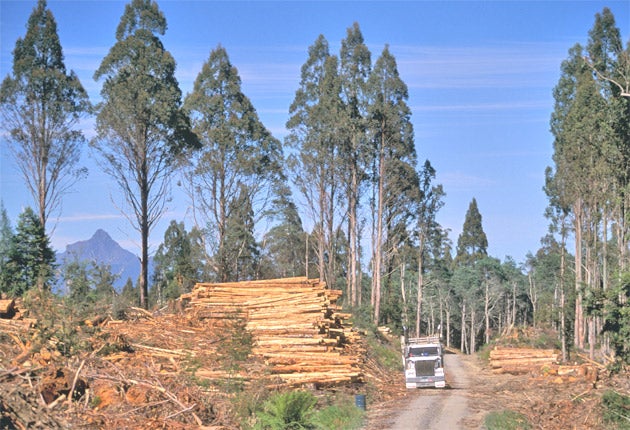Tasmania's forests saved after 30 years of fighting

Your support helps us to tell the story
From reproductive rights to climate change to Big Tech, The Independent is on the ground when the story is developing. Whether it's investigating the financials of Elon Musk's pro-Trump PAC or producing our latest documentary, 'The A Word', which shines a light on the American women fighting for reproductive rights, we know how important it is to parse out the facts from the messaging.
At such a critical moment in US history, we need reporters on the ground. Your donation allows us to keep sending journalists to speak to both sides of the story.
The Independent is trusted by Americans across the entire political spectrum. And unlike many other quality news outlets, we choose not to lock Americans out of our reporting and analysis with paywalls. We believe quality journalism should be available to everyone, paid for by those who can afford it.
Your support makes all the difference.For nearly three decades, Tasmania's ancient eucalypt forests have been the scene of pitched battles between environmentalists and loggers. Now, in a stunning volte-face, the forestry industry has called a truce, announcing that it will stop clearing old-growth native trees altogether.
The warring parties yesterday announced a "peace deal" that will see logging end virtually immediately in the most pristine forests, and over time, in all other native forests. It follows five months of secret talks between green groups, trade unions and the forestry industry.
The agreement marks a watershed for Tasmania, where sometimes violent clashes between activists and forestry workers have been part of the rhythm of life since the mid-1980s. There are also predictions that it will lead to old-growth logging being phased out elsewhere in Australia.
The island state, where the world's first Green party was founded in 1972, is regarded as the birthplace of the global environmental movement. It has been the scene of high-profile conservation battles, including an ultimately successful campaign in 1982 to prevent the Franklin River being flooded by a hydro-electric dam.
For a generation, logging at the 400-year-old forests in Tasmania – home to some of the world's tallest trees, including the 101-metre-high Centurion, a giant swamp gum second only to a 115-metre-high Californian redwood – has been a running sore. It is estimated that tens of thousands of hectares have been cleared over the past 25 years, with most of the timber exported as woodchips.
The historic agreement, which would have seemed inconceivable just a few years ago, is based as much on economic realities as a desire to end the hostilities. With demand for environmentally-friendly timber soaring in Tasmania's biggest market, Asia, the forestry industry is in decline. Just two days ago, a sawmill closed at Scottsdale, in the island's north-east, with the loss of 120 jobs.
The industry's new stance – which will eventually see it switch entirely to sustainable plantation timber – was revealed by Greg L'Estrange, chief executive of Australia's largest logging company, Gunns, in a speech last month. Admitting that the logging companies had lost the public relations battle, he announced that Gunns planned to stop felling old-growth forests.
Mr L'Estrange said: "The vast support of the Australian population is with the environmental non-government organisations ... We see that the conflict has to end."
Market imperatives were not the only spur for the new deal, which was presented to the Tasmanian premier, David Bartlett, yesterday. The election of a Labor-Green coalition in April was also a turning-point, signalling to the industry that it could no longer rely on the unconditional support of successive state governments.
Its change of direction, though, is likely to be keenly felt in a state where forestry is a big employer. Mr Bartlett cited the Scottsdale closure as "sadly ... more evidence that doing nothing is not an option". He added: "Many commentators have said difficult change is coming to the forest industry, whether we like it or not."
The timetable for the shift to plantation logging is one of the key details yet to be agreed at further talks to be held over the next 12 months. However, forestry executives warned yesterday that it could be another 30 years before plantations were able to supply hardwood timber of sufficient quality and quantity.
Terry Edwards, chief executive of the Forest Industries Association of Tasmania, said: "This will not be a rapid withdrawal from native forest harvesting."
Conflicts between loggers and protesters were still taking place as recently as last week, despite federal government action over the years to protect increasing swathes of forest and to compensate the industry. Tasmania is expected to seek federal assistance to help forestry contractors and workers affected by the new deal.
The tourism industry might receive a welcome boost. First-time visitors to Tasmania are often shocked to stumble across desolate, charred areas where every tree has been felled and all greenery burnt.
Join our commenting forum
Join thought-provoking conversations, follow other Independent readers and see their replies
Comments